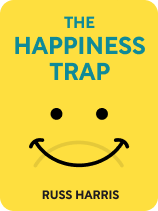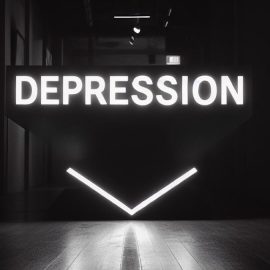

This article is an excerpt from the Shortform book guide to "The Happiness Trap" by Russ Harris. Shortform has the world's best summaries and analyses of books you should be reading.
Like this article? Sign up for a free trial here .
Can we control our emotions? And if so, to what extent?
Starting in childhood, we’re socialized to believe we should be able to control our emotions. The truth is that we can regulate only a small fraction of our thoughts and emotions—most of them are subconscious and beyond our control.
Here is why we actually exert less control over our thoughts and feelings than we think we do.
Can Emotions Be Controlled?
We are told to control our emotions from early childhood. Think of a parent telling their toddler to “be a big boy” and stop crying. We learn, at some point in our development, that we can control our emotions—or, at the very least, the expression thereof.
| How Children Learn They “Should” Control Their Emotions Research has identified three dominant ways we’re socialized to experience our emotions in early childhood: How our parents react to our emotions: If a parent tells their child to stop crying, the child thinks they should be able to stop, even though children have poor impulse control. How our parents discuss emotions: If a parent tells a child to control their anger, the child picks up the idea that anger is bad. How parents express emotion: If a child sees a parent trying to control their own emotions, the child assumes that they can and should learn how to control their emotions, too. Similarly, as children get older, they pick up further lessons about emotions from their peers, through: how their peers react to their emotions, how their peers discuss emotions, and how their peers express emotion. |
Furthermore, we assume we have control over our thoughts and emotions because, as humans, we’re able to control the physical world and transform it for our use. It’s hard to accept that the same species that invented the internal combustion engine by harnessing the power of fire, steel, and steam can’t simply dismiss an unhappy thought.
Finally, this idea is one of the fundamental claims of many self-help books, such as The Happiness Advantage and The Power of Positive Thinking. These books argue that you can control your thoughts and feelings to replace negative thoughts, like anger and guilt, with positive ones, like joy and gratitude.
However, we actually exert less control over our thoughts and feelings than we think we do: Tell yourself not to think of an elephant. Now, you’re probably thinking of an elephant. Therefore, you don’t control your thoughts.
Plus, the more intense our negative thoughts become, the more difficult they are to control. So while it may be possible to dismiss something minor, like irritation that your child is chewing with their mouth open, it would be much more difficult to dismiss grief over a loved one’s death.
Most Thoughts Are Beyond Our Awareness and Control
The truth is that we only control a small minority of our thoughts. Most of our thoughts are subconscious, meaning that they’re part of a constant background process of thinking. A small fraction of these slip into our conscious thinking, but we are unaware of the rest, and, thus, we don’t have the power to dismiss them.
Even actions that we believe we’ve actively chosen are executed largely by unconscious processes. For instance, we can choose to try to catch a football when it’s thrown to us, but the action of actually catching the football is something that the unconscious mind is more responsible for than the conscious one. This might be why we’re often surprised when our reflexes take over—like when your roommate unexpectedly tosses you the keys to the apartment and your hand snaps out to catch them.

———End of Preview———
Like what you just read? Read the rest of the world's best book summary and analysis of Russ Harris's "The Happiness Trap" at Shortform .
Here's what you'll find in our full The Happiness Trap summary :
- Why trying to be happy is making you unhappy
- How to practice ACT, or Acceptance and Commitment Therapy, to become happier
- How to develop “psychological flexibility” toward negative feelings instead of eliminating them






